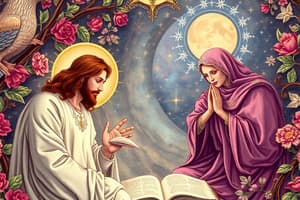Podcast
Questions and Answers
What are the Synoptic Gospels primarily focused on?
What are the Synoptic Gospels primarily focused on?
- The theological implications of Jesus' life
- Summarizing Jesus’ earthly life (correct)
- Theological controversies in the early Church
- Jesus' miracles during His ministry
What is the primary reason for the non-acceptance of the Gospel of Thomas by the Church?
What is the primary reason for the non-acceptance of the Gospel of Thomas by the Church?
- It lacked theological depth
- It was written too late to be credible
- It contained apostolic inaccuracies (correct)
- It contradicted the synoptic accounts
What significant event does the Annunciation in Luke 1:26–38 describe?
What significant event does the Annunciation in Luke 1:26–38 describe?
- The birth of John the Baptist
- Joseph's dream about Mary
- Mary's visit to Elizabeth
- The Angel Gabriel announcing Jesus' conception (correct)
How is the concept of kenosis relevant to the Passion and Cross?
How is the concept of kenosis relevant to the Passion and Cross?
In what way did Mary respond to the Angel Gabriel's message during the Annunciation?
In what way did Mary respond to the Angel Gabriel's message during the Annunciation?
What role does John the Baptist play in relation to Jesus, as per the content?
What role does John the Baptist play in relation to Jesus, as per the content?
What does the resurrection narrative primarily testify to?
What does the resurrection narrative primarily testify to?
What characterized the Church's understanding of sacrifices during Jesus' time, according to the mentioned content?
What characterized the Church's understanding of sacrifices during Jesus' time, according to the mentioned content?
What belief is associated with Nestorianism regarding Jesus' nature?
What belief is associated with Nestorianism regarding Jesus' nature?
Which of the following correctly describes the Nicene Creed?
Which of the following correctly describes the Nicene Creed?
How do early theologians like Augustine and Aquinas integrate their ideas?
How do early theologians like Augustine and Aquinas integrate their ideas?
Which mark of the Church emphasizes that it is set apart for God's purpose?
Which mark of the Church emphasizes that it is set apart for God's purpose?
What does the communication of idioms refer to in the context of Jesus?
What does the communication of idioms refer to in the context of Jesus?
What is the focus of the subjective model of salvation?
What is the focus of the subjective model of salvation?
What role does the Holy Spirit play in the sanctification of believers?
What role does the Holy Spirit play in the sanctification of believers?
What does the term 'Christus Victor' signify in soteriology?
What does the term 'Christus Victor' signify in soteriology?
What is meant by 'Creation Ex Nihilo'?
What is meant by 'Creation Ex Nihilo'?
Which model of salvation focuses on the personal faith of the believer?
Which model of salvation focuses on the personal faith of the believer?
What is the significance of the term 'kenosis' in Christian theology?
What is the significance of the term 'kenosis' in Christian theology?
Which is NOT one of the four marks of the Church?
Which is NOT one of the four marks of the Church?
What differentiates Christian baptism from John’s baptism?
What differentiates Christian baptism from John’s baptism?
What does the concept of 'Communication of Idioms' relate to?
What does the concept of 'Communication of Idioms' relate to?
What belief does Arianism reject?
What belief does Arianism reject?
In terms of eschatology, what is taught about the resurrection of the body?
In terms of eschatology, what is taught about the resurrection of the body?
Which heresy is associated with the belief that God appears in different modes?
Which heresy is associated with the belief that God appears in different modes?
What does the Nicene Creed address?
What does the Nicene Creed address?
Which of the following embodies the teaching of Christ regarding sacrifice?
Which of the following embodies the teaching of Christ regarding sacrifice?
What role does the Holy Spirit play in Christian theology?
What role does the Holy Spirit play in Christian theology?
Which statement reflects a key belief of the Christus Victor model of salvation?
Which statement reflects a key belief of the Christus Victor model of salvation?
Flashcards
Nestorianism
Nestorianism
A theological movement that denied Mary as the Mother of God, separating Jesus' divine and human natures.
Gnosticism
Gnosticism
A set of beliefs that claim secret knowledge is the path to salvation, rejecting material creation as evil.
Nicene Creed
Nicene Creed
This creed defines the Trinity and the nature of Jesus Christ. It refutes heresies like Arianism and Nestorianism.
Christianity and Greek Philosophy
Christianity and Greek Philosophy
Signup and view all the flashcards
Church's Stance on Science
Church's Stance on Science
Signup and view all the flashcards
Ordered World and Modern Science
Ordered World and Modern Science
Signup and view all the flashcards
The One Church
The One Church
Signup and view all the flashcards
The Holy Church
The Holy Church
Signup and view all the flashcards
Canonical Gospels
Canonical Gospels
Signup and view all the flashcards
Synoptic Gospels
Synoptic Gospels
Signup and view all the flashcards
Gospel of John
Gospel of John
Signup and view all the flashcards
Two Natures of Christ
Two Natures of Christ
Signup and view all the flashcards
Kenosis
Kenosis
Signup and view all the flashcards
Passion, Cross, and Resurrection
Passion, Cross, and Resurrection
Signup and view all the flashcards
Historicity of the Resurrection
Historicity of the Resurrection
Signup and view all the flashcards
Offering of Oneself
Offering of Oneself
Signup and view all the flashcards
Creation Ex Nihilo
Creation Ex Nihilo
Signup and view all the flashcards
Pre-Existence of Jesus
Pre-Existence of Jesus
Signup and view all the flashcards
Communication of Idioms
Communication of Idioms
Signup and view all the flashcards
Sermon on the Mount
Sermon on the Mount
Signup and view all the flashcards
The Holy Spirit
The Holy Spirit
Signup and view all the flashcards
Subjective Model of Salvation
Subjective Model of Salvation
Signup and view all the flashcards
Substitution Model of Salvation
Substitution Model of Salvation
Signup and view all the flashcards
Christus Victor Model of Salvation
Christus Victor Model of Salvation
Signup and view all the flashcards
Millennialism
Millennialism
Signup and view all the flashcards
Christian Baptism
Christian Baptism
Signup and view all the flashcards
Arianism
Arianism
Signup and view all the flashcards
Dynamic Monarchianism (Adoptionism)
Dynamic Monarchianism (Adoptionism)
Signup and view all the flashcards
Marcionism
Marcionism
Signup and view all the flashcards
Modalistic Monarchianism (Modalism)
Modalistic Monarchianism (Modalism)
Signup and view all the flashcards
Study Notes
I. Gospels
- Four Canonical Gospels: Matthew, Mark, Luke, and John.
- Synoptic Gospels (Matthew, Mark, Luke): Summarize Jesus' earthly life, beginning with the nativity and lineage.
- John's Gospel: Provides a theological account of Jesus' life, starting with the Logos (Word).
- Other Gospels (e.g., Gospel of Thomas, Gospel of Mary Magdalene): Not part of the official canon due to theological inaccuracies or lack of apostolic origin.
- Luke's Account of the Annunciation and Visitation: The angel Gabriel announces Mary's conception of Jesus; Mary visits Elizabeth, pregnant with John the Baptist.
- Connection between Birth of John the Baptist and Jesus: Both births were prophesied by angels; Zechariah doubted but Mary believed. John prepared the way for Jesus.
- Dynamics of the Passion/Cross/Resurrection: Jesus' suffering, death, and resurrection are not about divine punishment, but about kenosis (self-emptying love), demonstrating power to raise life over taking it. This contrasts with ancient and modern misconceptions of sacrifice as appeasing divine anger.
- The Passion/Cross/Resurrection is an act of violence, the litmus test of human pain, self-offering; God did not demand it.
II. Christology
- Jesus as a Divine Person with Two Natures: Fully human and fully divine, teaching what it means to be truly human. Humanity was intended for relationship with God and each other.
- Jesus as the Divine Logos: Pre-existed creation, not created but begotten, consubstantial, the second person of the Trinity.
- Communication of Idioms: How the divine and human natures in Jesus are united in one person.
- Events of the Passion: Suffering, death, and resurrection as described in the Gospels.
- Sermon on the Mount/Beatitudes (Matthew 5:1-12): Teachings on humility, mercy, and righteousness as paths to the Kingdom of Heaven.
III. Pneumatology (Study of the Holy Spirit)
- The Holy Spirit: Third person of the Trinity, consubstantial with Father and Son, involved in creation, redemption (Jesus' baptism, empowering the Church), and sanctification (guiding believers to holiness).
IV. Creation
- Tertullian's Argument for Creation Ex Nihilo: God created the universe from nothing, emphasizing His omnipotence and independence; God is the source of all things.
- Necessity of Creation Ex Nihilo: Demonstrates God's power and sovereignty, creation is a distinct act, not an extension of God.
V. Soteriology
- Three Models of Salvation:
- Subjective: Personal faith and acceptance of Christ.
- Substitution: Christ's sacrifice satisfies divine justice for humanity.
- Christus Victor: Christ's death and resurrection overcome sin, death, and the devil.
- True Meaning of Sacrifice: Kenosis (self-emptying love), dispelling false notions of sacrifice (e.g., appeasing God).
- Revelation of God's Truth: Jesus' life and sacrifice reveal who God is; resulting in a proper relationship between humanity and God.
VI. 4 Marks of the Church
- One: One Body, One God, One Spirit, One Baptism, One Faith.
- Holy: Set apart for God's purpose, holiness from God, expressed through teachings and sacraments.
- Catholic: Universal, Christ present in all times and places, consistent doctrines and sacraments, mission for all people.
- Apostolic: Founded on Apostles' teachings, continuing their mission through apostolic succession.
VII. Baptism
- John's Baptism vs. Christian Baptism: John's baptism was a call to repentance; Christian baptism cleanses sin, imparts grace, and incorporates believers into Christ's Body.
- Infant Baptism: A source of theological division, Catholic Church emphasizes God's grace as a gift, not dependent on merit.
- Effects of Baptism: Forgiveness of sins, new creation, sanctifying grace, incorporation into the body of Christ, participation in the priesthood of Christ, indelible mark on the soul.
VIII. Eschatology
- Resurrection of the Body: Glorified body united with the soul. 1 Corinthians 15:35–49, 2 Corinthians 4:16–5:10
- Millennialism: Belief in a 1,000-year reign of Christ; early views included interpretations, no definitive Catholic view point, not a literal thousand years.
IX. Heresies
- Arianism: Denied Jesus' divinity.
- Dynamic Monarchianism (Adoptionism): Jesus was adopted as God's Son.
- Marcionism: Rejected the Old Testament.
- Modalistic Monarchianism (Modalism): God appears as one person in different forms.
- Nestorianism: Denied Mary as the Mother of God, differentiating Jesus' natures.
- Gnosticism: Secret knowledge is the path to salvation, material creation is evil.
X. Creeds
- Nicene Creed: Defines the Trinity and Christ's nature, refuting heresies like Arianism and Nestorianism.
XI. Faith, Reason, and Science
- Christianity and Greek Philosophy: Early theologians integrated Greek thought with Christian theology (e.g., Augustine, Aquinas).
- Church's Stance on Science: Encourages inquiry aligning with faith and morals.
- Ordered World and Modern Science: Belief in an ordered creation grounded the scientific method.
Studying That Suits You
Use AI to generate personalized quizzes and flashcards to suit your learning preferences.





